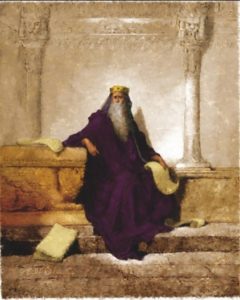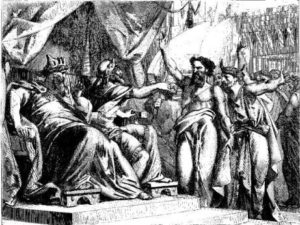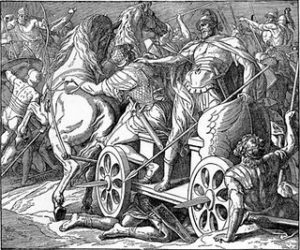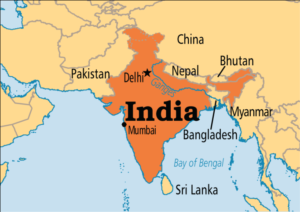SUMMARY OF KINGS FROM DAVID TO AHAB; THE PROPHET MICAIAH; PAUL PREACHES THE GOSPEL; A TRUE FRIEND
OLD TESTAMENT READING: 1 Kings 22
Today we come to the last chapter of 1 Kings.
The Book of First Kings begins with the death of King David and ends with the death of King Ahab. In the century and a half of history recorded in this book the rule of God and the rule of men are contrasted. The government of God is unfailing. The government of men, apart from God, is disastrous.
God is Yahweh and He is worthy to be the King of kings and Lord of lords. But His rule has been rejected by the kings of this world. By covenant, He is the God of Israel (and Judah). He is their true king. But His rule is not mirrored in their governments.
Israel disliked its distinction as a theocracy and had asked for a king that it might be like the other nations (1 Sam 8:20). First, God gave them a king after their own heart (Saul), then a king after His own heart (David). Then came the son of David, Solomon, who was appointed to build the temple which his father had planned and provided for.
Solomon’s reign brought a period of peace, prosperity and affluence that fueled his own pride, deceived his heart, generated apostasy, and initiated a despotic rule. He made the people’s yoke burdensome, hard and grievous (1 Kings 12:4).
Rehoboam succeeds his father Solomon as a more severe dictator. Due to the corruption of the house of David in Judah, God appoints Jeroboam, the son of Nebat, to lead the breakaway northern kingdom of Israel. Although given an opportunity to be blessed and to prosper, Jeroboam turns from the worship of Yahweh only, and in turning to other gods, he causes Israel to sin. In seeking to please people, he displeased God. He initiated a popular, “have it your way” religion of convenience and promoted idolatry, with golden calves at Bethel and Dan and built a capital city at Tirzah. (After the destruction of the King’s house at Tirzah, King Omni would establish the new capital of the northern kingdom at Samaria).
In the southern kingdom, Abijah, Asa and Jehoshaphat succeed Rehoboam. For David’s sake, God would not remove this dynasty. Abijah was not devoted to the Lord. Asa brought limited reform, doing what was right in the eyes of the Lord (15:11) with significant compromises, including making an unholy alliance with the king of Aram (15:18). Jehoshaphat did the same, making an unholy alliance with King Ahab.
The spiritual condition of the northern kingdom goes from bad to worse. Jeroboam had caused the people of Israel to sin, and the kings that came after him continued to do evil in the eyes of the Lord. The kings of the northern kingdom of Israel were consistently evil. These leaders did nothing to promote the welfare of their kingdom. They saw the throne only as a means of satisfying their own ambitions. Jeroboam’s son, Nadab, is assassinated by Baasha. Elah succeeds his father, Baasha, but is murdered by Zimri. Zimri’s seven-day reign is ended with suicide. Omri leads Israel in war with Syria (Aram). The dynasty of Omri is characterized by apostasy. They are given to pagan worship. Omri’s son Ahab marries the Sidonian princess, Jezebel, and builds a temple for the worship of Baal at Samaria.
In contrast to the rule of these flawed kings is the rule of God. The rule of God is now communicated not through the kings, but through the prophets.
As we have been reading through the Bible, we have seen the foreshadowing of the Messianic Office in the mediatorial work of the priest (and his sacrifices), the king (and his rule), and the prophet (and his message). In this way Aaron, David and Elijah have pointed to a Greater Priest, King and Prophet, the Lord Jesus Christ. The role of the prophet now comes to the fore in the history of Israel. At this time of history, it is the prophet and not the king who most accurately communicates the rule of God.
We see this function in the prophetic role of Samuel and Nathan in the Book of I and II Samuel. In the Book of I Kings, God makes His will known through Ahijah (11:26-29), Shemaiah (12:21-24), the unnamed “man of God from Judah” (13:1-10), Jehu (16:1-4) Elijah (17-21) and Micaiah (22:8-28).
Today we read of Micaiah.
Godly Jehoshaphat, although he had a heart for God and His Word, foolishly agreed to help King Ahab in an ungodly pursuit in battle (2 Chron 19:1-3). (Jehoshaphat married his son to a daughter of Ahab (2 Chron 18:1; 21:4-7; 1 Kings 22:44; 2 Kings 8:16-19). But before joining King Ahab to recapture Ramoth-Gilead, in the tribal lands of Gad, now overtaken by the Syrians (Aram), Jehoshaphat asks that they first inquire of the Lord (22:5).
Approximately 400 of the prophets are ear-tickling “possibility thinkers” and supply “positive affirmations”, uniformly bringing favorable reports to King Ahab. Their message brought encouragement to the king. They were similar to motivational speakers today who proclaim- “Whatever the mind can believe, you can achieve!” (22:6,10-12), but they do not bring the mind of the LORD.
Jehoshaphat recognized that these prophets were not of the LORD (22:7). Ahab knew that there was one man “by whom we may inquire of the LORD: but I hate him, because he does not prophesy good concerning me, but evil…he is Micaiah, son of Imlah.”
14 But Micaiah said, “As the LORD lives, what the LORD says to me, that I shall speak.” (1 Kings 22:14 (NASB)
Micaiah at first mocks the king by giving Ahab instruction to go ahead with his plans. Ahab recognizes that the prophet is toying with him.
1 Kings 22:1616 Then the king said to him, “How many times must I adjure you to speak to me nothing but the truth in the name of the LORD?”
Then Micaiah prophesies the truth and predicts Ahab’s death.
1 Kings 22:17 17 So he said, “I saw all Israel scattered on the mountains, like sheep which have no shepherd. And the LORD said, ‘These have no master. Let each of them return to his house in peace.” (22:17)
Micaiah speaks of God’s sovereign will that recognizes the king’s propensity to deception. The LORD tells the truth: citing their sin and proclaiming disaster. The popular prophets are permitted to continue to proclaim lies. But God’s purpose is not thwarted.
Micaiah declares what he sees as being God’s sovereignty over Satan and his demons. In bringing due judgment upon Ahab, he allows deceiving spirits to entice Ahab to disregard God-given truth and go to his disastrous death in his attempt to release Ramoth-Gilead from the control of the Arameans (1 Kings 22:19-23).
Micaiah’s vision correlates with other accounts of events that take place prior to Revelation 12:7-12 when Satan and fallen angels have some degree of access to communicate with the Lord (See Job 1:6-12; Luke 22:31).
The true prophets were called by God to communicate the mind of Him who sits on the Throne. They paid a price for their obedience. Micaiah was imprisoned and given a diet of bread and water.
The prophet Micaiah saw the state of affairs as they truly were. Jesus would echo these words as he looked upon apostate Israel. “They are like sheep which have no shepherd”, “scattered on the mountains”. (1 Kings 22:17; Matt 9:36; Mk 6:34). As Micaiah is mistreated by the kings and false prophets of Israel, so they would mistreat Jesus.
The false prophet Zedekiah, the son of Chenaanah, strikes Micaiah on the cheek. Micaiah warns that not only would Ahab be killed but Zedekiah would have to hide himself in an inner chamber during the attack.
The word of the Lord came true. Ahab took precautions and went into battle in disguise while King Jehoshaphat went out in his true kingly garments. Ironically, Jehoshaphat is spared, and Ahab is killed by what appeared to be “a certain man” who “drew his bow at random” (22:34).
The words of Elijah also came true:
1 Kings 21:19 (NASB) 19 ‘Thus says the LORD, “In the place where the dogs licked up the blood of Naboth, the dogs will lick up your blood, even yours.”‘
Ahaziah, son of Ahab, reigned for two years and was succeeded by his brother Joram (otherwise called Jehoram). The precise prophecy of the dogs licking blood on Naboth’s property was fulfilled in the death of Joram (21:29; 2 Kings 9:25-26).
Let us learn the lessons from I Kings. We do not put our trust in the governments of men. Like the prophets of old, we are called to be subject to the Word of God and faithfully communicate it to others.
When we read Micaiah’s prophecy in 1 Kings 22:19-22, where God allows an evil spirit who desires to deceive Ahab to go up and fall at Ramoth Gilead, we might wonder about God’s relationship with evil. It is important to note that Ahab was already in a pattern of rejecting God’s Word and giving in to the deceptive prophecies of men. Ahab is given over to his desires, and his rejection of God’s Word is reinforced as God permits the evil spirit to further reject Micaiah’s advice that God’s judgment would fall.
We may not understand all the reasons why God allows evil, but this is what we do understand:
- We understand from Scripture that God Himself is all good. In Him there is no darkness at all.
1 John 1:5 5 This is the message we have heard from Him and announce to you, that God is Light, and in Him there is no darkness at all.
Psalm 11:7 7 For the LORD is righteous, He loves righteousness; The upright will behold His face.
Mark 10:18 18 And Jesus said to him, “Why do you call Me good? No one is good except God alone (Also Matthew 19:17).
- God created a world that was good, but mankind fell into sin by giving in to Satan’s lie.
Romans 5:12 12 Therefore, just as through one man sin entered into the world, and death through sin, and so death spread to all men, because all sinned—
Romans 3:12 12 ALL HAVE TURNED ASIDE, TOGETHER THEY HAVE BECOME USELESS; THERE IS NONE WHO DOES GOOD, THERE IS NOT EVEN ONE.” (Psalm 14:1)
- God hates all evil, judges evil, and has a plan to one day do away with evil completely (Revelation 20:10-15) through the redemptive work of His Son, Jesus the Christ.
- The good news is that Jesus came to live and die to save sinners. He provides reconciliation and regeneration, restoring the life of God to the soul of sinners who repent of their sin and believe on Him as their only Lord and Savior.
- He will recreate the world anew in Christ to make it good again.
Revelation 21:1 1 Then I saw a new heaven and a new earth; for the first heaven and the first earth passed away, and there is no longer any sea.
Revelation 21:4-5 4 and He will wipe away every tear from their eyes; and there will no longer be any death; there will no longer be any mourning, or crying, or pain; the first things have passed away.” 5 And He who sits on the throne said, “Behold, I am making all things new.” And He *said, “Write, for these words are faithful and true.”
- God is sovereign, and has control over evil (Luke 22:31), is stronger than evil (Matthew 13:41-43; 2 Thess 2:8; Rev 19:11-21; 1 John 4:4), and uses everything, both good and evil, for his good purposes (Psalm 76:10; Genesis 50:20; Romans 8:28). The actions of Satan and his demons, who in themselves are intent on evil, can be used by God, to serve as His instruments for His good purpose of executing judgment.
NEW TESTAMENT READING: Acts 13:16-41
How wonderful it is to hear the apostles preach the gospel! Paul begins with God’s story as he recounts “the message of this salvation” (Acts 12:26) in the Old Testament, a story that they were in some ways familiar. He recounts their history beginning with their bondage in Egypt where God made from the 12 sons of Jacob a great people. He speaks of their deliverance at the Exodus, their 40 years of wandering in the wilderness, their conquest of the seven nations of Canaan, and the allotment of land for the tribes in a period of approximately 450 years. Then came the period of the Judges until Samuel the prophet. The people ask for kings like their surrounding nations. Saul is raised up as the king of their choice and removed. Then David, A MAN AFTER GOD’S HEART, is raised up. God makes a covenant with David and promises that a descendent will reign upon the throne forever. This, Paul declares, refers to Jesus, whom John proclaimed to be the Savior.
What is the gospel? It is the message of this salvation that has come in Jesus Christ (13:26). It is a message about God’s promise of a ‘Savior’ (v.23) and One worthy to establish the eternal reign of God’s kingdom. Paul preaches that Jesus was crucified by those who lived in Jerusalem and their rulers who neither recognized Him nor the prophecies they read every Sabbath. (Jesus was crucified according to the Scriptures- 1 Cor 15:3. He was buried (v 29) and raised from the dead as the firstborn from the dead, the representative of a new deathless humanity, fulfilling Psalm 2:7, Isaiah 55:3 and Psalm 16:10.)
7 “I will surely tell of the decree of the LORD: He said to Me, ‘You are My Son, Today I have begotten You. (Psalm 2:7)
Paul announces that Jesus is the fulfillment of the Davidic covenant who is promised everlasting life and an everlasting kingdom.
Paul concludes with the gospel promises:
Acts 13:38-39 (NASB) 38 “Therefore let it be known to you, brethren, that through Him forgiveness of sins is proclaimed to you, 39 and through Him everyone who believes is freed from all things, from which you could not be freed through the Law of Moses.
Isaiah 55:3 (NASB) 3 “Incline your ear and come to Me. Listen, that you may live; And I will make an everlasting covenant with you, according to the faithful mercies shown to David.
Paul warns them not to ignore this truly marvelous message but to obey its command- to believe on the Lord Jesus Christ to receive the New Covenant promises of forgiveness of sins, life and liberty through His gracious provision of righteous atonement on the cross.
PSALM 138:1-8
One great promise, one great fact, and one great prayer:
Psalm 138:8 (NASB) 8 The LORD will accomplish what concerns me; Your lovingkindness, O LORD, is everlasting; Do not forsake the works of Your hands.
PROVERBS 17- Thank God for true friends.
Proverbs 17:17-18 (NASB) 17 A friend loves at all times, and a brother is born for adversity. 18 A man lacking in sense pledges and becomes guarantor in the presence of his neighbor.
PRAY FOR THE NATIONS:
WE CONTINE TO PRAY FOR INDIA
(Using the Prayer Guide “OPERATION WORLD”)
Republic of India
Asia
The “new India” is a youthful, ambitious, cosmopolitan and modern entity, where differences of religion, caste and gender mean less and less. It is increasingly urban and tech-savvy. India of call centers, cricket, Bollywood, bhangra and globally connected culture is exposed to and open to new ideas and ways of living, including Christianity. The most significant influence in this context is materialism- as capable of entrapping Hindus as any other group. This younger generation- 70% of India is under age 35, and 31% under the age of 15- will shape India’s future. As such, they are hugely strategic group to reach for Jesus; completely new and different missiological strategies must be undertaken to communicate and model the gospel to them. Indian churches and mission are now focusing on the issue; initial success thus far is very modest.
India has more human need than any other nation- largely by virtue of its massive population, but also due to many areas of suffering that must be addressed through considered action and sustained prayer.
Health concerns affect huge swathes of India’s population. Around 40% of children under age three suffer from malnutrition, since inadequate sanitation and lack of clean water multiply the waterborne diseases that impact mostly children and the poor. In India, an estimated 900,000 people per year die as a result of drinking unclean water or breathing polluted air. The health sector is overstretched, under-resourced and prone to corruption. India has the world’s third largest HIV positive population and accounts for one-third of the world’s tuberculosis cases. Excellent healthcare and medical training were two of Christianity’s finest contributions to India. These are under threat due to Christian emigration/brain drain. Pray that this important legacy be preserved.
Manage the economic situation with wisdom. India has the world’s highest number of poor, the fourth-most millionaires and the greatest disparity between rich and poor. Millions enter the workforce every year; millions of jobs must be created to sustain them. Amid a growing economy and a growing middle class, ways to reduce poverty must also be found.
Wisely address increasing threats to stability, including terrorism, tensions with neighboring countries, and Hindu nationalist groups and their targets: Christians, Muslims and Naxalites/Communists.
PRAYER: Father, we stand amazed that we should be called Your children. Thank You for sending Your Son, who is not ashamed to call us siblings. He is a true friend who loves at all times, born for adversity to be our very present help in times of trouble. We praise You for the gospel. We have a living Savior! He is the perfect priest, king and prophet! We can rest in His perfect work of redemption, His perfect rule in His kingdom, and He unfailing Word!
We remember the people of India today and ask that You, the Lord of the harvest, will send forth laborers into the harvest fields of this land, bringing light, life and liberty through the gospel! In Jesus’ Name!
Pastor David
So, naturally, we proclaim Christ! We warn everyone we meet, and we teach everyone we can, all that we know about him, so that, if possible, we may bring every man up to his full maturity in Christ. (Colossians 1:28, J.B. Phillips paraphrase)
